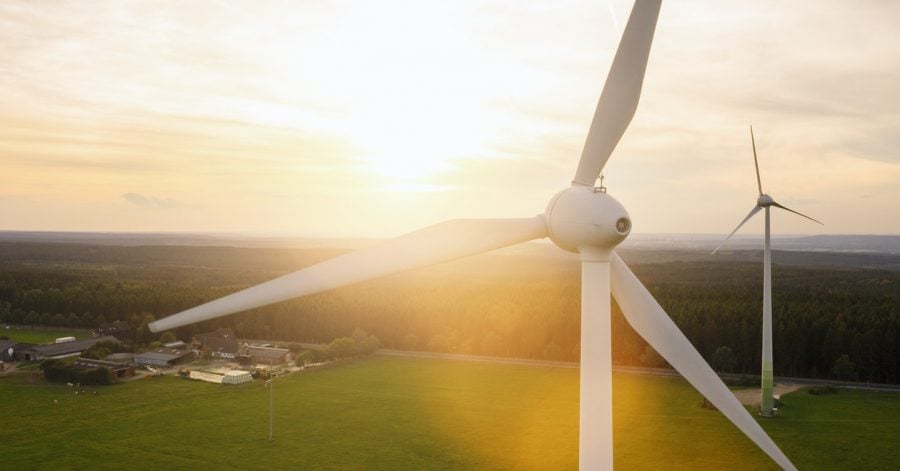Fresh projects and announcement for significant investments in renewables throughout 2021 suggest that North Macedonia’s authorities will try to transform the country into a renewable haven in the upcoming years.
The installed capacity for electricity production from renewable energy sources in North Macedonia is about 29 percent of the total capacity, according to an annual report from the country’s Energy Regulatory Commission.
North Macedonia aims to increase this percentage up to 50 percent by 2024. And recent developments in the energy sector suggest that this could become a reality.
According to the country’s now former prime minister Zoran Zaev, who oversaw most of the announced projects and investments in green energy, North Macedonia aims to “make the first energy transition in the region, as an example for the countries of the Western Balkans.”
“Using renewable energy sources and replacing coal with gas is one of our most important strategic priorities. In that direction, we are developing a serious strategic energy plan,” Zaev pointed out on many occasions during last year.
Wind farms and solar parks to the rescue
In June 2021, the Austrian Erste Group announced that together with the Austrian development bank OeEB, they would finance the construction of the country’s second wind farm project called Bogoslovec, in a deal worth €61 million. The 36 MW (megawatt) wind farm is expected to be completed by 2023, producing clean energy for more than 20 thousand households.
In October 2021, German wind and solar park developer wpd said that it would participate in North Macedonia’s biggest direct greenfield investment. The project is a 400 MW wind park called “Virovi”, worth €500 million and expected to be completed in six years. The country also signed a strategic partnership with wpd for 45 years.
At the end of November, French renewable energy power producer Akuo Energy announced it would invest €270 million in a solar park with a capacity of up to 400 MW in the country. The plant’s construction is expected to be completed by the end of 2024.
Transforming old facilities into new renewable capacities
Towards the end of the year, North Macedonia also took its first steps towards a clean energy transition. The country’s authorities constructed a 10 MW solar power plant on a depleted thermal plant site.
According to the European Bank for Reconstruction and Development, which financed the project, the new Oslomej solar power plant will help prevent more than 12 thousand tonnes of CO2 emissions.
“Authorities are determined to shut down REK Bitola by 2030 and rebuild TEC Oslomej into a solar power plant. The announced investments for the construction of wind power plants are also aimed at decarbonization of the energy sector. Therefore, we can expect that in the coming period, authorities will strengthen their efforts and integrate green programs and projects”, EU environmental law expert Emina Rustemoska tells The Recursive.
When it comes to the use of hydropower, North Macedonia has eight large hydropower plants and 96 small hydropower plants.
In the country’s total capacity for electricity production, hydropower participates with 33,52 percent. In 2020, the country’s hydro power plants participated with 25 percent in the total electricity production. A part of the current emergency now is due to less rainfall recently, which has left reservoirs low.
While there is an enormous potential for hydropower in the country, there are also many failed attempts for big projects in this sector over the last few decades. The projected Cebren hydropower plant is one of those projects.
With a projected installed capacity between 333 and 458 MW and a projected annual production of 1000 to 1200 gigawatt-hours of electricity, the Cebren project has seen 11 failed public calls during the last three decades, mostly due to shortcomings in the procedure and issues with potential investors meeting the requirements.
However, in 2020, nine international companies met the pre-qualification requirements in the last public call, which makes North Macedonia’s authorities optimistic that the €600 million worth project will finally become a reality.
Energy transition as a requirement for EU accession process
A candidate country for more than 16 years, North Macedonia’s bid to join the EU could play an essential part in its transition to renewable energy sources.
As the country is looking to begin the long anticipated accession negotiations with the EU, some of the requirements also include increasing the share of renewable and clean energy.
In turn, when the country gets the green light and begins the EU negotiation process, this could also lead to an accelerated transformation of its energy sector, as it would need to adhere to those requirements.
“There have been some more notable steps towards improving the situation, such as increasing the protected areas, declaring new national parks, as well as stopping the construction of hydropower plants”, Rustemoska points out.
The country can also benefit from the EU’s Green Agenda Action Plan for the Western Balkans, expected to provide €9B in grants and €20B in investments for climate action reforms in the region.
The Action Plan addresses reforms aimed at climate action, pollution control, nature protection, biodiversity, and regional integration.
Additionally, the country is also using a significant amount of funding from the EU and other international institutions for renewable energy projects. Therefore, North Macedonia’s potential accession to the EU could also significantly increase the country’s clean energy potential and help it avoid a long term energy crisis.








